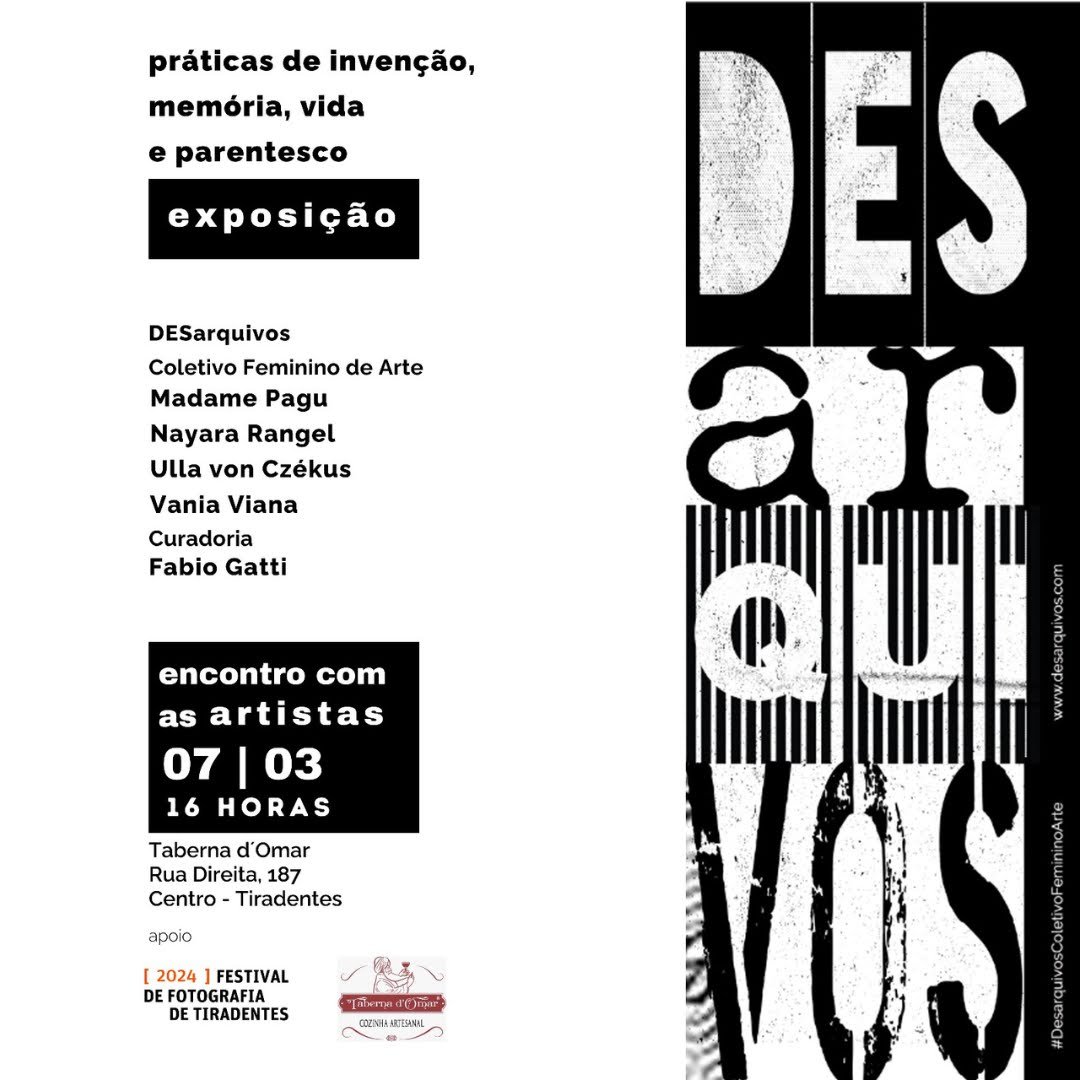DESarquivos - práticas de invenção, vida e parentesco
O DESarquivos Coletivo Feminino de Arte, formado por Madame Pagu, Nayara Rangel, Ulla von Czékus e Vania Viana, participou do Festival de Fotografia de Tiradentes com:
uma exposição, com curadoria de Fábio Gatti.
uma roda de conversa
instalação de um Lambe
a projeção de um curta-metragem sobre o trabalho do coletivo
e uma roda de conversa no palco principal do Festival, no dia internacional das mulheres, discutindo sobre fotografia de arquivo com artistas do ACHO Arquivo Coleções de Histórias Ordinárias, com a mediação de Fabiana Bruno.
O trabalho do coletivo se debruça sobre o feminino, a percepção da passagem do tempo e as memórias, a partir de fotografias de arquivo, para narrar histórias que cultivam memórias reais e fabuladas.
Arquivo é o lugar onde tudo se encontra ordenado, catalogado, descrito. Desarquivar, portanto, é tornar visível, devolver à vida, acessar memórias. “Desarquivar é nossa maneira de desvelar a atualidade das angústias que muitos dos contratos sociais precisam reavaliar, como posturas e regras que foram, ao longo do tempo, impostas às mulheres”, comenta Fábio Gatti.
A exposição reúne quatro trabalhos: Motherhood, Ainda Paisagem, White Balance e Tudo o que cai na água voa. “Ao abrirem suas vidas privadas, as artistas desarquivam não a sua memória, mas o apagamento delas, enquanto emprestam ao presente o devir futuro. Cada qual ao seu modo, cria práticas de invenção, de vida e de parentesco na individualidade dos seus trabalhos e na comunhão entre eles”, conta Fábio Gatti.
DESarquivos Coletivo Feminino de Arte, formed by Madame Pagu, Nayara Rangel, Ulla von Czékus and Vania Viana, participated in the Tiradentes Photography Festival with:
an exhibition, curated by Fábio Gatti.
a conversation circle
installation of a Lambe
the screening of a short film about the collective’s work
and a conversation on the main stage of the Festival, on International Women's Day, discussing archival photography with artists from the ACHO Arquivo Coleções de Histórias Ordinárias, with the mediation of Fabiana Bruno.
The collective's work focuses on the feminine, the perception of the passage of time and memories, based on archive photographs, to narrate stories that cultivate real and fabled memories.
Archive is the place where everything is ordered, catalogued, described. Unarchiving, therefore, means making visible, returning to life, accessing memories. “Unarchiving is our way of revealing the current anxieties that many social contracts need to reevaluate, such as attitudes and rules that have been, over time, imposed on women”, comments Fábio Gatti.
The exhibition brings together four works: Motherhood, Ainda Paisagem, White Balance and Tudo que cai na água voa. “By opening up their private lives, the artists unarchive not their memory, but the obliteration of it, while lending the future to the present. Each one in their own way, creates practices of invention, life and kinship in the individuality of their work and in the communion between them”, says Fábio Gatti.



















